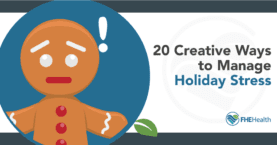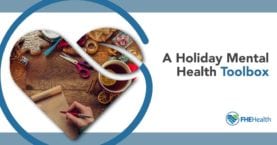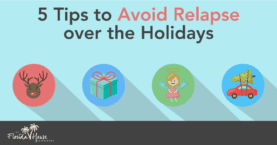
The holidays are supposed to be a cheerful time to spend with family and friends, but for those struggling with addiction, the combination of holidays and recovery from addiction can bring unwanted emotions and memories. Combined with the high stress, high expectations and commitment, those in recovery can feel overwhelmed with dread and despair.
If you’re in recovery and feeling the holiday sadness settle in, it’s important to prepare yourself so you can avoid relapse and restarting the cycle of addiction. For anyone having difficulty with the holidays approaching, here are a few tips for managing addiction recovery during the holidays.
Treatment can begin quickly and discreetly, get started now It’s not uncommon to feel anxiety and stress during the holidays, and being in addiction recovery can compound these emotions. Approximately 64% of adults with a history of mental illness report higher levels of stress and symptoms around the holiday season. Recognizing triggers and stressors is one of the best ways to cope with depression and sadness. These stressors may include financial issues, hectic work schedules, strained relationships with family and loneliness. To alleviate the pressure that spending the holidays in recovery can bring, plan on how much money you can spend and stick to your budget. Avoid family and friends who may trigger negative emotions, and create a relaxing space to retreat to when you need it. By preparing in advance and expecting these issues, you can make spending the holidays in addiction recovery easier to manage. Although the holidays are a time to think about others, you shouldn’t overdo it. Take time daily to sort out your thoughts and relieve some anxiety. Think about things you’re thankful for and the holiday stress will seem minimal in comparison. If meditation helps manage your stress, put a few moments aside each day to give your mind some quiet time. You can also journal about events happening during the day or take time out to exercise. A short walk can release endorphins and increase feelings of pleasure and happiness. To prevent sadness related to brand-new love handles, try to eat in moderation. A diet high in sugars will cause you to crash, amplifying upset feelings or other mood swings. Remember to get some exercise in so that your endorphin levels remain high and your moods are more easily manageable. You can also fight exhaustion with the right amount of sleep, which is vital for mood regulation and can help with unexpected feelings of sadness. If you know you’re going to have to manage holidays and recovery from addiction alone, it’s important to be prepared. It’s good to know if you’ll be alone in advance because you can plan meetings with nonfamily members who support your recovery and sobriety. Reach out to sponsors, treatment peers and friends who’d spend some time away from their families to help you during the holidays in recovery so you won’t have to go through every moment alone. Ready to start? More questions about treatment? Those in recovery experiencing the sadness holidays can bring often feel that way because it’s the first holiday season they’ll be spending without the comfort of drugs or alcohol. It’s hard to walk away from tradition, even if that tradition is rooted in drug and alcohol use. Just because you can no longer celebrate the holidays with your drug of choice doesn’t mean the time is wasted. If you are in recovery during the holidays, find new ways to celebrate, like attending events you wouldn’t have if you weren’t sober, planning holiday gatherings or going to recovery meetings to spend time with your peers. The holidays are a great time to refresh yourself on your recovery goals. Determine what you’d like to accomplish in the year with your recovery goals in mind. Additionally, if you know those feelings of sadness can occur, plan to attend 12-step meetings so you can focus on recovery during the holiday season. Treatment can begin quickly and discretely, get started now Holding past resentments can prove deadly, as they’re the cause of a number of relapses annually. The holiday season is a great way to release the feelings that are holding you and your recovery back. The holidays are also a great time to focus on your spirituality. Even if you aren’t a religious person, work to understand your spiritual connection during this magical time of year. Once you can identify with a higher power, you’ll find that sobriety will come easier for you, especially during the holidays in recovery from addiction. It can be difficult to celebrate without being tempted to drink. If you are in recovery during the holidays, you may choose to isolate yourself from celebrations to avoid the temptation, but that can lead to increased feelings of sadness and loneliness. To prevent unwanted drinking, always make your own drinks and carry one around at all times. If you always have a drink in your hand, no one will ever assume you need another. Additionally, if you’re going to a party where you know there’ll be drinking, connect with a peer who can stay sober with you. That way, you can benefit from helpful monitoring and motivation from a friend as you celebrate the holidays in recovery. If you’re planning a party of your own, choose to serve nonalcoholic drinks. Schedule fun activities such as board games, watching a holiday classic or shopping together. Include family and friends in the planning, and remember, you can have sober fun and don’t need alcohol to have a good time. The most important thing to remember about holiday sadness is that it’s okay to seek help. If you find yourself concerned about a possible relapse, talk to your therapist, doctor or social worker about addiction recovery during the holidays. Sometimes, all it takes is professional support to get you on the right track. Contact FHE Health to connect with a care team today. We offer 100% confidential and individualized treatment Meghan Blackford is a Social Media Consultant with over ten years of advertising and digital marketing experience, who helps curate... read moreNeed Help?
What are Some Holiday Triggers and Stressors for Those in Recovery from Addiction?
What Are Some Coping Strategies for Managing Emotions?
How Can Moderating Your Diet Help?
Why Is It Important to Seek Support From Loved Ones and Professionals?
Begin your recovery today
How Can You Celebrate the Holidays in Recovery?
How Can You Be Recovery Ready?
Start Treatment Now
Let Go of the Past
Embracing Positive and Sober Holiday Traditions
Seeking Support for Holiday Sadness and Recovery from Addiction
More Questions about Treatment?
![]()
About Meghan
Footer









